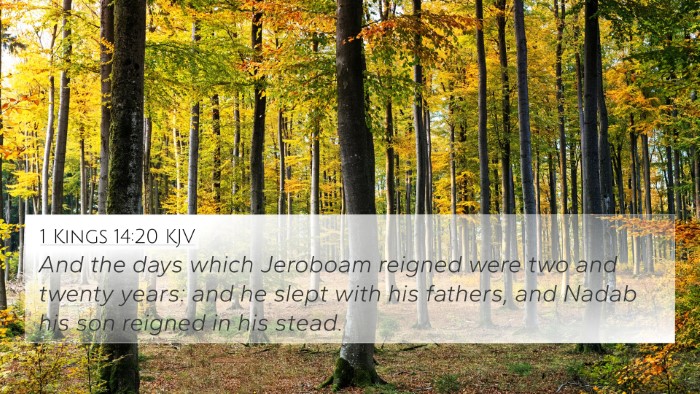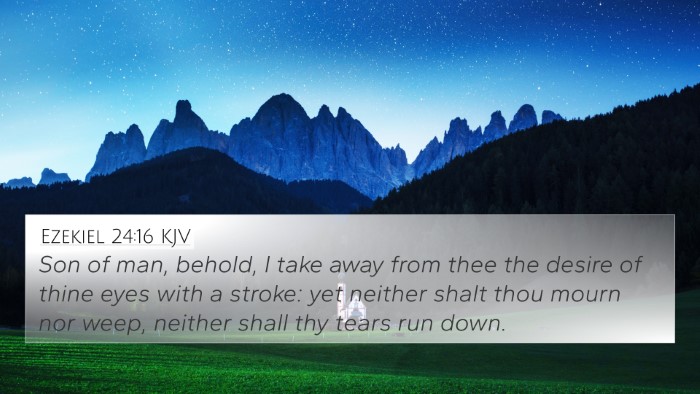Understanding 2 Chronicles 13:20
“Neither did Jeroboam recover strength again in the days of Abijah: and the Lord struck him, and he died.”
This verse encapsulates a significant moment in the biblical narrative during the reign of Abijah, king of Judah, and the conflict with Jeroboam, king of Israel. It serves as a striking reminder of the divine will and the sovereignty of God over the affairs of men.
Summary of the Verse's Meaning
In this verse, we see the culmination of a power struggle between the two kingdoms of Israel and Judah. Jeroboam, despite his efforts and military might, faced spiritual defeat due to his disobedience against God. The verse indicates that Abijah's reign was blessed by God and that Jeroboam’s strength diminished under divine judgment.
Insights from Public Domain Commentaries
Matthew Henry's Commentary
Matthew Henry emphasizes that this verse illustrates the consequence of turning away from God. Jeroboam's loss of strength reflects God's active involvement in the affairs of nations and the ultimate futility of opposing God's chosen leaders. Henry notes that the striking of Jeroboam by God was a demonstration of divine retribution for his idolatry and rejection of true worship.
Albert Barnes' Commentary
Albert Barnes points out that Jeroboam's inability to recover strength was a direct act of God’s judgment. He underlines that the passage serves as a theological underpinning that links physical and spiritual vitality to obedience to God's commandments. Barnes also highlights how this serves as a warning against the consequences of sin.
Adam Clarke's Commentary
Adam Clarke interprets this verse as a marker of God’s sovereignty in the politics of Israel and Judah. He explains that Jeroboam’s death was not merely a political defeat but a spiritual one, reflecting the deeper biblical principle that fidelity to God results in national stability and strength. Clarke also discusses the significance of divine judgment and the hope for those who maintain fidelity to God.
Bible Cross-References for 2 Chronicles 13:20
- 1 Kings 14:16 - “And he shall give Israel up because of the sins of Jeroboam, who did sin, and who made Israel to sin.”
- 2 Chronicles 12:1 - “And it came to pass, when Rehoboam had established the kingdom, and had strengthened himself, he forsook the law of the Lord, and all Israel with him.”
- 1 Kings 12:28 - “Whereupon the king took counsel, and made two calves of gold, and said unto them, It is too much for you to go up to Jerusalem...”
- Jeremiah 23:1 - “Woe be unto the pastors that destroy and scatter the sheep of my pasture! saith the Lord.”
- Isaiah 31:1 - “Woe to them that go down to Egypt for help; and stay on horses, and trust in chariots, because they are many...”
- Psalm 1:6 - “For the Lord knoweth the way of the righteous: but the way of the ungodly shall perish.”
- James 4:6 - “But he giveth more grace. Wherefore he saith, God resisteth the proud, but giveth grace unto the humble.”
Connecting the Context of 2 Chronicles 13:20
This verse, while specific to its historical context, resonates with larger themes throughout Scripture. The battles between the kingdoms of Judah and Israel are reflective of the broader spiritual warfare present in the Bible. Jeroboam’s fate serves as an admonition of the risks of leading others astray from God’s path.
Thematic Bible Verse Connections
Several themes emerge when examining this verse:
- The Sovereignty of God: God's authority governs the outcomes of human affairs.
- Consequences of Sin: The biblical theme remains consistent that turning away from God results in judgment.
- The Role of Leadership: The text signifies the impact of a leader's faithfulness or unfaithfulness on the nation.
Tools for Bible Cross-Referencing
To delve deeper into the connections between Bible verses, one might consider utilizing a Bible concordance, cross-reference guides, and thematic studies to identify the intertwining narratives and lessons found within Scripture.
Conclusion
2 Chronicles 13:20 serves as a profound reminder of God’s justice and active role in the history of His people. The cross-references not only strengthen the understanding of this verse but also encourage believers to reflect on the implications of their faith and obedience. As one studies and cross-references these Biblical texts, a clearer picture of God’s overarching narrative unfolds — a narrative that calls for faithfulness, reverence, and acknowledgment of His sovereignty.









